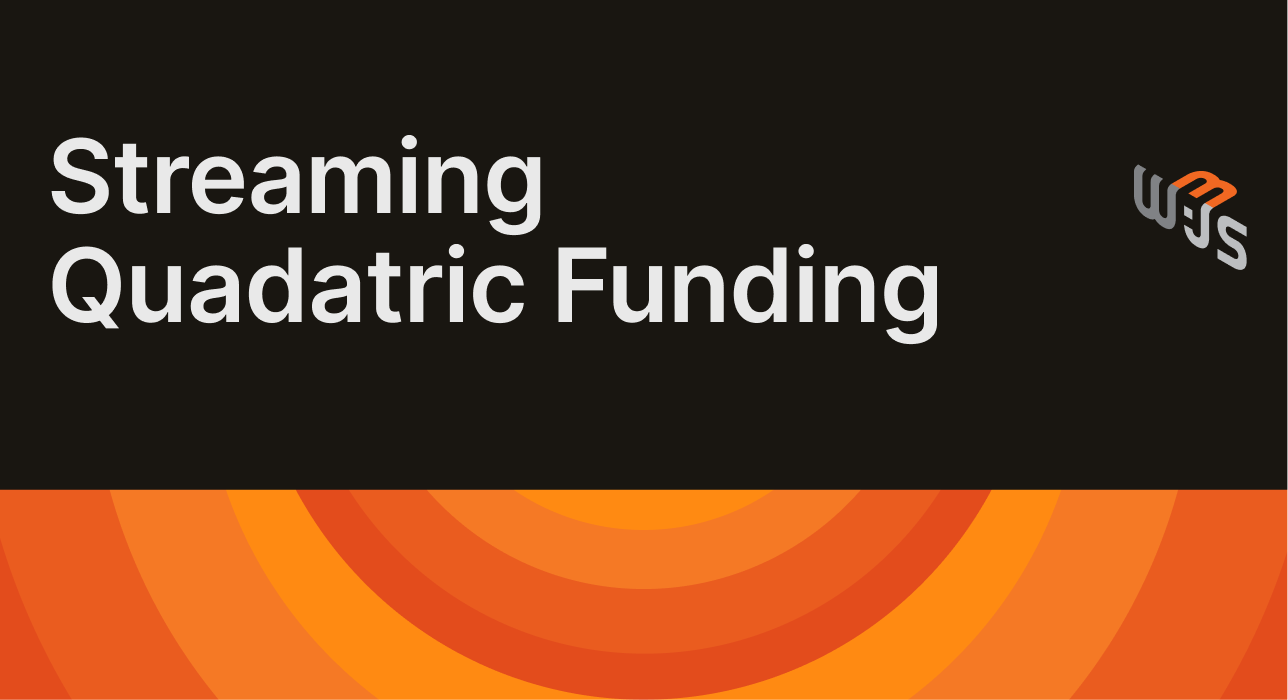Web3.js Participates in the First Streaming Quadratic Funding Round

Exciting news! Web3.js has joined the pilot program to participate in the first Streaming Quadratic Funding Round! This collaborative effort by Geo Web, Superfluid, and Gitcoin's Allo Protocol represents a novel approach to funding public goods.
By participating in this first-ever SQF round, web3.js stands to gain a significant advantage in its development lifecycle. Let's unpack what this all means.
A new era of funding
At the heart of the Streaming Quadratic Funding (SQF) lies a commitment to revolutionizing financial support for public goods.
SQF is inspired by Quadratic funding (QF), a concept hailed for its democratic approach to allocating resources. It ensures that the distribution of funds is equitable and reflective of the community's collective priorities.
What is Streaming Quadratic Funding?
While traditional QF involves single, discrete donations matched according to a quadratic formula, SQF introduces a dynamic element: Time.
In SQF, donations are made as ongoing streams instead of lump sums. Funds are continuously allocated to projects based on the donations they receive. This method uses a quadratic matching formula to determine the distribution of funds in a communal pool, considering the number and size of the donations, thus favoring broad community support over individual donations.
Donors can adjust their donation stream based on new information or a change in preferences.
Today is a huge day on the Geo Web: we’re launching the Streaming Quadratic Funding Pilot w/ @superfluid_HQ & @alloprotocol by @gitcoin. SQF is a novel implementation of QF that is *funded* & *distributed* in real-time.
— Geo Web (@thegeoweb) February 21, 2024
It’s effectively like running a QF round every second. pic.twitter.com/CemmMHvGc5
SQF's impact on public goods
SQFs revolutionize the traditional quadratic funding model by introducing a continuous, open-ended approach that aligns more closely with the core democratic principles of community-driven support while enhancing the effectiveness and efficiency of funding public goods.
By moving away from the constraints of periodic funding rounds, SQF enables grantees to focus on their missions without competing for attention in limited time frames, allows for the immediate use of funds, and fosters stronger, more natural donor-grantee relationships.
This model not only offers predictable funding for grantees but also improves the allocation of resources through a more agile and action-oriented governance structure, demonstrating a significant leap in how community funds can drive sustainable growth and innovation.
The impact on web3.js
By being part of the first-ever SQF round, web3.js stands to gain a significant advantage in its development lifecycle.
The SQF's dynamic and real-time funding mechanism aligns perfectly with the agile development principles critical to open-source projects like web3.js. As community support fluctuates, so can the resources allocated to development efforts, enabling a more responsive and adaptive approach to project priorities.
The funding model allows for the prioritization of features, bug fixes, and infrastructure improvements based on immediate community responses, fostering a development environment that is both innovative and user-centric. SQFs can enhance a project's ability to evolve to the needs of developers and end-users.
Looking ahead
As we venture into this uncharted territory, the journey of web3.js within the Streaming Quadratic Funding Pilot Program offers a glimpse into the potential for collaborative innovation in the web3 space. It highlights the importance of embracing new ideas and partnerships to foster a more vibrant and sustainable ecosystem for public goods.
The success of this initiative could serve as a blueprint for future funding models, emphasizing the value of community-driven support mechanisms. As web3.js and other grantees navigate this experiment, their experiences will undoubtedly provide valuable insights into the possibilities and challenges of sustaining public goods in the future.
“Streaming Quadratic Funding is something we've been dreaming of building for over a year on the Geo Web. Our protocol produces streaming revenue, and we've always aspired to maximize the impact of public goods. When Superfluid started talking about their Streaming Distributions feature, Allo shipped their v2 protocol, and Gitcoin Passport went on-chain. All of a sudden, we had the components to pull it off starting late last year. Now we're just excited to support the worthy public goods in the pilot, see how the continuous nature of the mechanism changes the donor/grantee experience, and explore more real-time governance composability!” - Graven Prest, Founder of SQF
Learn more about web3.js
If you want to explore web3.js:
Still have questions? You can connect with other developers and get web3.js support in the ChainSafe Discord channel. Just go to #web3js-general for all your questions 😀
About ChainSafe
ChainSafe is a leading blockchain research and development firm specializing in protocol engineering, cross-chain interoperability, and web3 gaming. Alongside its contributions to major ecosystems such as Ethereum, Polkadot, and Filecoin, ChainSafe creates solutions for developers across the web3 space utilizing expertise in gaming, interoperability, and decentralized storage. As part of its mission to build innovative products for users and improved tooling for developers, ChainSafe embodies an open-source and community-oriented ethos to advance the future of the internet.
Website | Twitter | Linkedin | GitHub | Discord | YouTube | Newsletter

